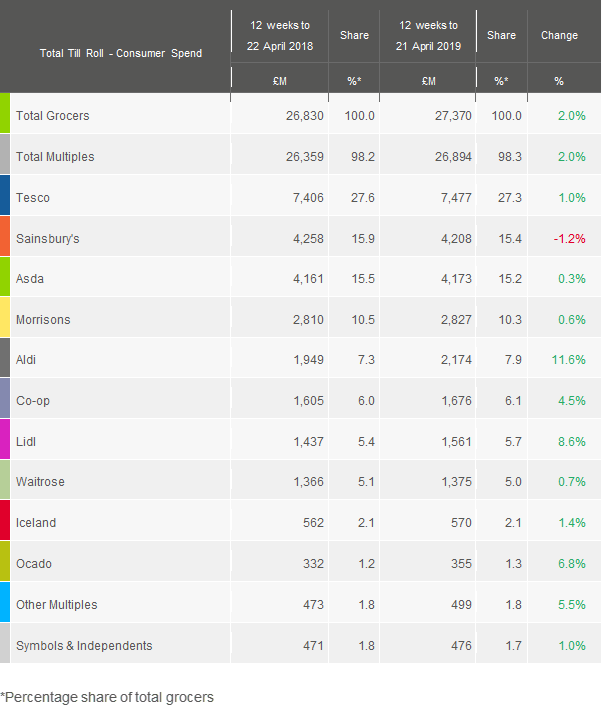Latest grocery market share figures from Kantar show the sector recording its fastest rate of growth for 2019, bolstered by a record-breaking £2.5bn spent during the sunny Easter weekend. Whilst the Big Four supermarkets all saw lacklustre performance, particularly Sainsbury’s, the discounters continued to gain market share.
Total year-on-year sales increased by 2.0% during the 12 weeks to 21 April 2019 as shoppers indulged in £335m worth of Easter chocolate. The warm weather over the four-day break also boosted sales of products such ice cream and hay fever remedies.
Growth of 8.6% pushed Lidl’s market share to a new high of 5.7%, up 0.3 percentage points compared with last year. Kantar highlighted that half of Lidl’s sales now come from the fresh and chilled aisles with its performance this period fuelled by customers spending an extra £14m on dairy items and £13m on fruit, vegetables and salads.
Aldi remained the fastest growing supermarket in the UK, a position it has held since July 2018. Aided by its store-opening programme, the discounter attracted an additional 823,000 shoppers through its doors to grow sales by 11.6% and increase its market share by 0.6 percentage points to 7.9%.
Following last week’s decision by the CMA to block the proposed Sainsbury’s-Asda merger, Tesco’s position as the UK’s largest supermarket remains secure. Fraser McKevitt, head of retail and consumer insight at Kantar, commented: “More than three quarters of British households visited Tesco in the past 12 weeks, over five million more than each of its two closest rivals. Though sales were up 1.0%, growth was behind the market which meant a loss of share compared with last year to 27.3%.
“Meanwhile, Sainsbury’s and Asda are continuing to battle it out for second place. Two thirds of the public were aware of the proposed merger: the majority of those who knew about the CMA ruling didn’t have an opinion as to whether it was a good or bad outcome, while only one third welcomed the decision.”
Sainsbury’s is due to release its annual results tomorrow with investors looking to the chain’s management to outline how they plan to refocus the business and halt its sales decline. Kantar’s latest data shows that Sainsbury’s has reclaimed the second position it lost to Asda last month despite its sales continuing to fall (-1.2%). However, the group did achieve double-digit growth online.
Asda’s sales edged up 0.3% but its market share slipped to 15.2%. McKevitt commented: “The average Asda shopping basket increased in value and shoppers visited more often. Asda remains strong in its northern heartland with the north of England and Scotland accounting for more than 40% of sales.”
He added: “Despite movement at the top of the table, the phrase ‘Big Four’ continues to hold meaning and Morrisons’ 10.3% market share means it sits comfortably ahead of the fifth largest retailer, Aldi. Alcohol sales were the biggest contributor to Morrisons’ 0.6% growth this period.”
Apart from the discounters, the Co-op and Ocado were the only other retailers to gain market share on last year, moving to 6.1% and 1.3% respectively. Kantar highlighted that the Co-op was able to capitalise on the periods of warmer weather as people shopped closer to home in convenience stores. Its ‘Irresistible’ range, especially crisps, snacks, biscuits and pizzas, proved particularly popular with sales up 11% on last year.
Meanwhile, Kantar’s data showed that grocery inflation stood at 1.4% during the period with prices rising fastest in markets such as cola, lamb and crisps, while falling in instant coffee, fresh sausages and nuts.

NAM Implications:
- Tesco’s market share gradually falling…
- Anyone prepared to bet this will continue until it reaches a non-threatening 25%, from a government perspective?
- Meanwhile, Asda & Sainsbury’s re-slug it out in ‘business as usual’…
- …while all await unveiling of Plan B tomorrow.




